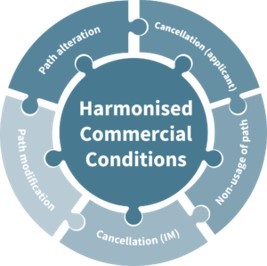Introduction
The TTR project was launched with the goal of facilitating the efficient and timely allocation of rail infrastructure capacity. It aims to increase both the quality and quantity of international rail traffic while also providing the flexibility required by the market to support a greater modal shift to rail. To ensure the successful implementation of the new capacity management system, it became evident that certain measures were necessary to prevent the inefficient use of rail capacity by all involved stakeholders. Specifically, inefficiencies arise due to:
- Unstable or excessively short-term planning of infrastructure availability, leading to changes in already allocated capacity.
- Capacity being blocked but only partially used—or not used at all—by stakeholders.
By introducing harmonized commercial conditions, stakeholders are encouraged to book and use capacity products as efficiently as possible and support effective capacity management. Some sets of commercial conditions are already in use across Europe, but they remain subject to strict national rules and lack proper international harmonization.
Applicants requesting international train paths must therefore navigate through widely differing national regulations, resulting in inconsistent handling of various steps and differing consequences for the same international train path.
While TTR aims to develop and implement a harmonized capacity process, harmonized commercial conditions will further facilitate international transport planning under a single commercial framework across Europe, even though monetary values will continue to be determined at the national level.
Approach
Achieving capacity gains through TTR’s new processes is only possible if the sector can effectively steer the behavior of both Applicants and Infrastructure Managers (IMs). This means that Applicants should only order the capacity they genuinely need, while IMs must ensure that infrastructure works—Temporary Capacity Restrictions (TCRs)—are coordinated in a way that maximizes the available capacity.
Experts have identified the following cases that require regulation through commercial conditions, including:
- Path cancellation by the Applicant
- Path cancellation by the IM
- Path modification by the Applicant
- Path alteration by the IM
- Non-usage of a path by the Applicant

In December 2023, the RNE General Assembly adopted the first Guidelines for Harmonized Commercial Conditions. Although the document was developed by infrastructure management experts participating in a dedicated RNE Task Force, input from Applicants and other stakeholders were continuously considered throughout its creation and for the following updates.
RNE is continuously promoting exchanges with all sector stakeholders, as well as the SERAF groups organized by the European Commission, to address challenges and ensure the successful and transparent implementation of commercial conditions across Europe.
The project received further energy with the publication of the draft Capacity Regulation by the European Commission in July 2023. This regulation has now entered trilogue discussions with the European Parliament and the Council of the European Union, following the adoption of respective positions in 2024. Indeed, the draft Regulation includes a specific article on the incentive mechanism, which aligns with RNE’s harmonized Guidelines and will form part of the European Framework for Capacity Management.
Many elements of the draft regulation are already reflected in the guidelines, while others remain under discussion for future updates to the harmonized mechanism. The key elements of the Commission’s proposal include:
- Reciprocity of the mechanism
- National determination of economic incentives
- Respect for national railway network and traffic specifications
- Consideration of all capacity products, including multinational capacity
The rail sector acknowledges the challenges ahead. For Applicants, these challenges include market uncertainties and intense competition, while for IMs, the primary difficulty lies in ensuring planning stability for TCRs due to various factors such as late financial allocations, procurement processes or regulatory approvals. Nevertheless, all stakeholders are collaborating to ensure that the new legislation establishes a harmonized commercial approach across European countries.
Update of the Guidelines proposal for Harmonised Commercial Conditions
The Commercial Conditions Guidelines are subject to constant improvements. In 2025, updates are planned to include new requirements of the upcoming Capacity Regulation. After a RNE task force (TF) produced a first draft, other stakeholders – particularly applicants – were invited to provide their feedback on the draft.
Following the consultation phase, which concluded on 23 August, the RNE task force analysed the inputs received and updated the Guidelines for Harmonised Commercial Conditions proposal. Moreover, the IMs’ experts elaborated a Report providing an overview on the input received and assessments.
The updated Guidelines proposal in tracked changes mode and the Report are available for download:
On 6 November, RNE organised a webinar to:
- Share the key input provided by participants of the Commercial Conditions Consultation and the feedback of the TF members.
- Present the resulting changes made to the Guidelines based on stakeholder input.
- Answer questions and foster open exchange between RNE and the sector
The session recording is now available here:
The proposed updated Guidelines are submitted for adoption at the RNE General Assembly meeting in December 2025, subject to the outcomes of the trilogue negotiations on the Capacity Management Regulation.
Further updates will be provided via the RNE website.
Contact
If you have further questions, please feel free to contact the chair of the Commercial Conditions project, Daniele Imbriani.